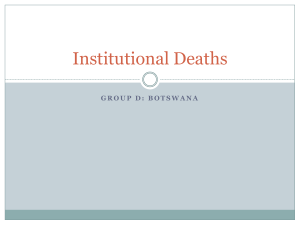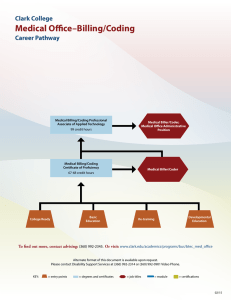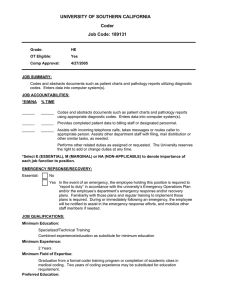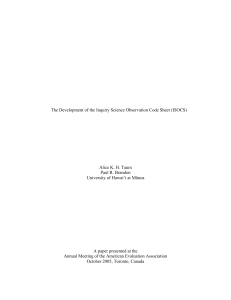Importance of consistent and accurate Clinical Coding
advertisement
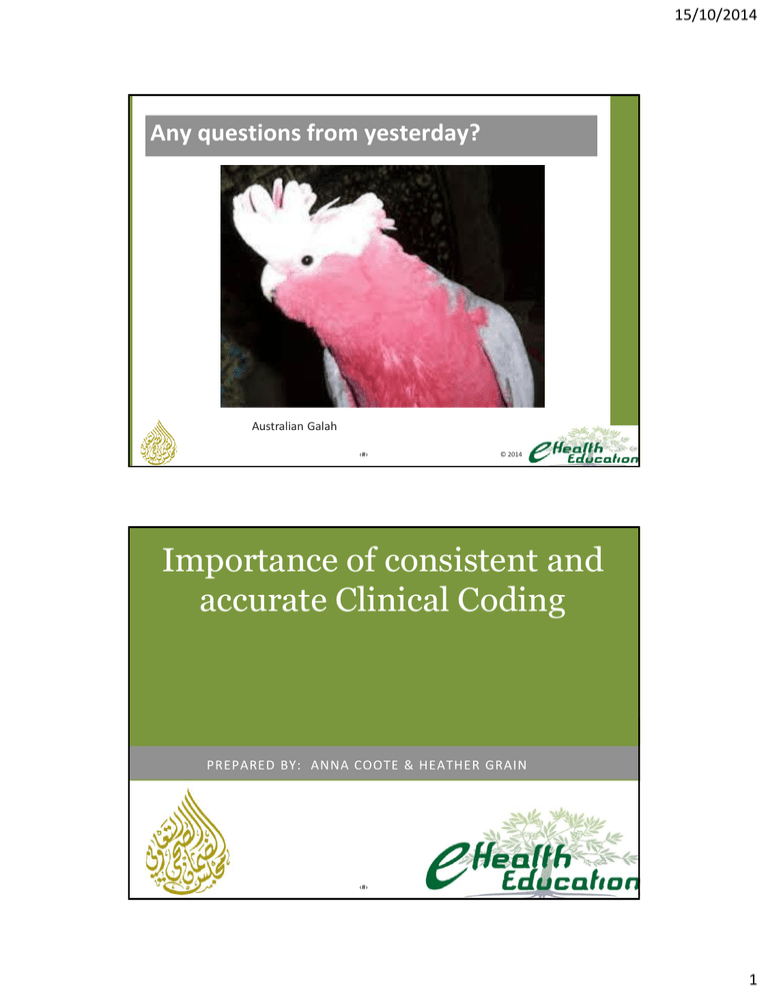
15/10/2014 Any questions from yesterday? Australian Galah ‹#› © 2014 Importance of consistent and accurate Clinical Coding PREPARED BY: ANNA COOTE & HEATHER GRAIN ‹#› 1 15/10/2014 Objectives • Understand the importance of consistency and accuracy of Clinical Coding for DRGs, Casemix, ABF • Understand the relevance of the Clinical Coders Code of Ethics to consistency and accuracy • Understand the differing (and often conflicting) needs of Coding for: • • • • • funding, Clinical research, clinical decision making Management and planning Understand the Clinical Coding audit process ‹#› © 2014 Code of Ethics for Clinical Coders Provides guidance for Clinical Coders in reflecting accurately the clinical characteristics of patient and health service interventions Enable clinicians and health care administrators to understand the ethical obligations of Clinical Coders. ‹#› © 2014 2 15/10/2014 Code of Ethics for Clinical Coders Code of Ethics for Clinical Coders The National Centre for Classification in Health (NCCH) is an Australian centre of expertise in classification of morbidity, cause of death and health interventions. One of the Centre's objectives is to develop and promote standards of coding practice, including ethical practice. This Code of Ethics has been developed by NCCH to provide guidance for clinical coders in reflecting accurately the clinical characteristics of patient and health service interventions. Clinical data are used for research, monitoring public health, and for the planning, evaluation and funding of health services. The Code will also enable clinicians and healthcare administrators to understand the ethical obligations of coders. ‹#› © 2014 Code of Ethics for Clinical Coders 1. 2. 3. Participate in quality improvement activities to ensure that the quality of coding supports the use of data for research, planning, evaluation and reimbursement, in the spirit of mutual respect for colleagues. Ensure all information necessary for abstraction and coding processes is available. Apply the Australian Coding Standards (ACS) and other official reporting requirements for the purpose of: • abstracting diagnoses and procedures using the entire clinical record • selecting and sequencing diagnosis and procedure codes • optimising reimbursement only when legitimate. 6 © 2014 3 15/10/2014 Code of Ethics for Clinical Coders 4. Ensure that clinical record content justifies selection of diagnoses and procedures, consulting clinicians as appropriate. 5. Participate in ongoing education to ensure that skills and knowledge meet the appropriate level of competence. ‹#› © 2014 Code of Ethics for Clinical Coders 8. Refuse to participate in or conceal illegal or unethical processes or procedures. 6. Contribute to ongoing development of classification systems in conjunction with appropriate coding and clinical experts. 7. Observe policies and legal requirements regarding confidentiality of patient related clinical information. 8 © 2014 4 15/10/2014 Ayres Rock ‹#› © 2014 Clinical Coder’s Creed …clinical coders will often need to make decisions which are based on their experience and common sense as well as the resources available to them. When you look at what clinical coders do objectively, they assign numbers from a structured, classification system to complex, ever-changing medical concepts which are not documented in a standardised way – no wonder it can be difficult! To revisit the fundamental skills of the clinical coder: . 10 © 2014 5 15/10/2014 Clinical Coder’s Creed To revisit the fundamental skills of the clinical coder: • A clinical coder has a thorough, working knowledge of medical science and terminology. • A clinical coder can read the clinical record and make decisions about the appropriate codes to assign, based on the clinical documentation. • A clinical coder understands the structure and use of a statistical classification. 11 © 2014 Clinical Coder’s Creed Clinical Coders' Creed These things are the fundamentals of the art and science of clinical coding: Clinical documentation Communication with clinicians Coding standards Conventions Classification experience Common sense sCience of medicine ‹#› © 2014 6 15/10/2014 The Olgas ‹#› © 2014 What makes accurate coding? • Abstracting – searching the medical record to find all of the diagnoses and procedures meeting the requirements of the ACS • Assessing – that all documentation necessary for complete coding is available • Obtaining – missing information • Choosing - the correct Principal Diagnosis and Principal Procedure ‹#› © 2014 7 15/10/2014 What makes accurate coding? • Completely coding –all of the Diagnoses and Procedures according to the ACS • Sequencing – listing the diagnoses and procedures in the correct order • Data entering – ICD and ACHI codes, and other relevant data • Correcting – using Coder-Clinician queries 15 © 2014 Clinical Coding Audit Camel racing in Alice Springs, Australia 16 © 2014 8 15/10/2014 Clinical Coding auditors Qualifications Experience Colleague auditing Experienced external auditors 17 © 2014 Clinical Coding Audits Educational not disciplinary Clear aim – coding or DRGs? • Automated • • Real time After the event • In house • • Regular Qualified auditor OR coding staff • Find the $ audits • External 18 © 2014 9 15/10/2014 Audit sample • Random sample • Targeted sample • Use a health statistician 19 © 2014 Audit reports • Percentage with DRG change • Increase in weight • Decrease in weight • Types of error resulting in DRG change • • • • • • Clinical documentation Choice of Principal diagnosis/procedure Missed codes Aust. Coding Standard error Sequencing Etc. 20 © 2014 10 15/10/2014 Audits – educational not disciplinary 21 © 2014 The End….any questions? 22 © 2014 11


